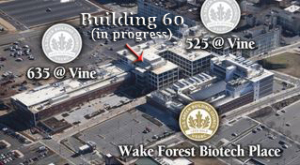Wexford Science & Technology, a subsidiary of BioMed Realty and Baltimore-based business, has repeatedly sought-out and converted historic tobacco manufacturing plants into some of the greenest adaptive reuse buildings in the country.
As tobacco use and processing is a major “no-no” in the world of sustainability, this is an impressive and symbolic feat. Wexford has taken great care in transforming the once booming R.J. Reynolds Tobacco Company’s manufacturing buildings into some of the most sustainable laboratory, office, and retail spaces in Winston-Salem. The buildings are all major renovations, preserving the region’s historic character, and include some of the nation’s oldest installations of glass block, allowing for natural light while also providing visual obscuration. Bringing life back to Winston-Salem, the newly named “Wake Forest Innovation Quarter” has increased the appeal for businesses and universities to pursue technological innovation by adding offices and laboratories in historic Winston-Salem, North Carolina.
The Wake Forest Innovation Quarter, sometimes known as Piedmont Triad Research Park, includes Wake Forest Biotech Place achieving LEED Gold certification as well as Inmar 525 at Vine Street and 625 at Vine Street, which both rose to LEED Platinum status in early 2014.
Wexford continuously breaks ground in sustainability. To expand on the Wake Forest Innovation Quarter, Wexford Science & Technology has begun to gut the 60 Series Buildings, formerly part of the R.J. Reynolds Tobacco Company district, for a major renovation. The 60 Series Buildings are pursing LEED Gold, and will complement the nearby laboratory and office space as a visionary incubation space for science and technology. Also, coming on-line in close proximity to the other LEED projects is the Baily Power Plant that once powered the cigarette maker’s manufacturing operations in downtown. The former power plant is expected to be filled out as a public venue with entertainment offerings, tying the whole research park together as an attractive destination for revitalization of the Winston-Salem downtown area. Wexford is also funding the construction of the 1.6 acre Bailey Park at East End in space south of Biotech Place.
For Wexford, a former cigarette factory and tobacco company in Raleigh-Durham could be the next step in their vision of sustainable adaptive reuse for new laboratory, office and retail space targeting LEED.
Whether repeatedly pursuing and redeveloping former tobacco facilities is coincidence or a calculated effort by Wexford, their transformations of buildings that were once seen as harmful and dirty into spaces that are forward-thinking and sustainable, is commendable and innovative to say the least.

